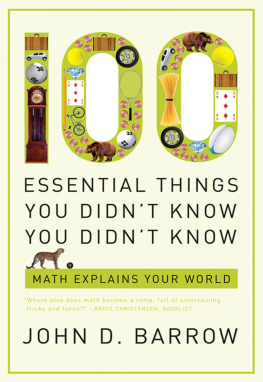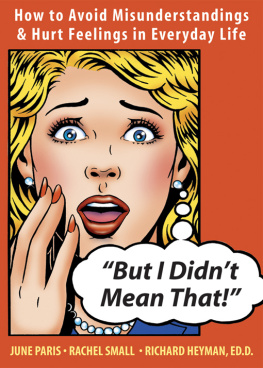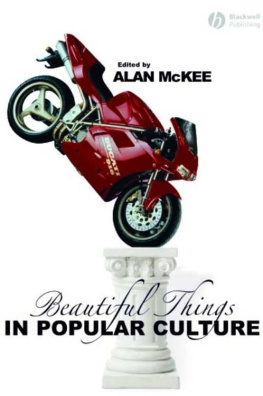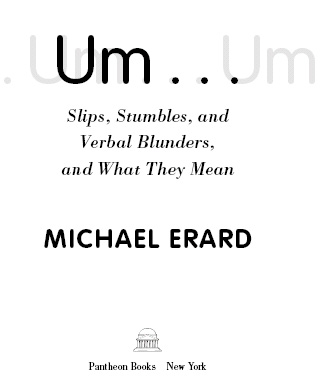I want some hot poppered butt cornI mean cot buttered bop cornthat iscorn buttered pop butt, or rather cuttered pot born, I meanoh well, gimme some peanuts.
Thesaurus of Humor, 1940
If you are a young man, for instance, will it not be from small pointers that you will conclude that you have won a girls favor? Would you wait for an express declaration of love or a passionate embrace? Or would not a glance, scarcely noticed by other people, be enough? A slight movement, the lengthening by a second of the pressure of a hand?
So do not let us underestimate small indications; by their help we may succeed in getting on the track of something bigger.
Sigmund Freud
A Note to the Reader
As you read this book, you may find that you begin to notice how people actually speak. That reaction is perfectly normal. You may also become more aware of your own speaking. This, too, is normal.
Your heightened awareness may also make you want to point out to your friends, loved ones, colleagues, and even random talkers their every verbal blunder. This is not recommended. For the sake of harmony, point out only the most interesting ones.
What is an interesting verbal blunder? Youd be surprised.
Introduction
T ranscribers at the Federal News Service in Washington, D.C., encounter bucketloads of verbal blunders every weekday morning. Their small office contains six desks with computers and dictaphones and a shelf filled with almanacs and dictionaries. On a wall hangs a whiteboard scrawled with the unfamiliar words, names, and acronyms of this news cycle. Today its Tamiflu, LIHEAP, and III-MEF. Next to a government spokesmans name, someones scribbled a hearthe sounds like hes good-looking, one of the transcribers teases. Across the hall in another small room, dozens of Marantz tape recorders on shelves are prepared to catch audio feeds from around the city and the country. At ten oclock, the world of government and business begins to talk in earnest, and the words from White House briefings, federal agency press conferences, congressional hearings, and corporate speeches begin to flow to the recorders, now alive and humming, or through audio streamed through the Web. Once a cassette contains about four minutes of speaking, the news director carries it to the transcribers office and lines it up on a low cabinet with other tapes. A transcriber will bring the tape to his or her cubicle, put it in the transcribing machine, and start typing the segment. Theres no talking in the room, only the sounds of fingers on keyboards, feet on foot pedals, and tapes rewinding. For eight hours a day the transcribers turn speech into text, spinning these ordinary words, Rapunzel-like, into a commodity posted on Web sites and sold to hundreds of clients.
The transcripts have to be readable, so the transcribers generally clean up peoples speaking, as instructed by an in-house style guide that cautions, Dont type um, ah, er, or partial words. The style guide also stipulates that transcribers should clean up a false start or starts consisting of only one or two words if the omission of the words does not affect the meaning.
There is one exception to those rules: DO NOT clean up major policymakers, including the president, the style guide says, since not only what they say but how they say it often makes the news. When George H. W. Bush was president he gave a speech commemorating Pearl Harbor Day but mistakenly gave the date as September 7, so the Federal News Service (FNS) transcribers kept September 7. (The White House corrected the error to December 7.) Alice Tate, a cherub-faced woman with red hair who is the supervisor of the news transcription team and has been an FNS employee for twenty years, mentioned that President George W. Bush had recently praised the efforts of a national counterism director.
Tate left counterism intact. Sometimes he kind of stumbles, she says of Bush, and we have to make a decisionsince we dont type partial wordsis a word a combination of words hes messed up? Bush isnt the only contributor to a document circulated in the office, the duh files, which contains many of the gaffes, flubs, solecisms, and bloopers that fall into transcribers laps. There was Howard Dean trying to say incentivize, which came out like this: What that does is incense providers to do more than just park kids in front of the television. There was an Atlanta reporter asking Secretary of Defense Donald Rumsfeld, Is our current situation such that the harder we work, the behinder we get?
More common verbal blunders dont make the duh filestheyre excised from transcripts, scrubbed out for the sake of readability. Another veteran transcriber, Cate Hagman, says that shes stopped hearing uh and um in peoples speech. Because FNS cuts them from transcripts, she automatically wipes them from what she hears, too. Other verbal tics still irritate her, though. Transcribing makes you very sensitive to verbal tics. Like, you know, I mean. Our parents were rightwe should drop them from our speech, but youd be surprised to see how many responsible people put them in. Surely the politicians say them unconsciouslyjust as the ordinary listener unwittingly lets them pass by.
On the other side of the country, a team of robotics researchers at SRI International, a research institute in Menlo Park, California, paid attention to the fillers and interruptions of ordinary speaking with another purpose in mind. In the early 1990s, they developed a robot named Flakey, a three-foot-tall black box designed to roam around the SRI offices, like a large, mobile, single-minded filing cabinet that could move out of the way of walking humans and navigate obstacles. It could also understand spoken commands to retrieve objects from various places in the institute. The problem was, however, that if you ordered Flakey to go on a mission, you didnt know for several seconds if the robot had comprehended what you said. It would sit there, humming. So you might repeat yourself, giving Flakey two commands to process and perhaps confuse, making it stall.
This didnt make for the smoothest human-machine relationships. Liz Shriberg, a speech researcher who was studying how uh and um function in human communication, suggested that her colleagues program Flakey to say uh. One could say, Flakey, go to so and sos office and get me the folder, and the robot would say uh, in order to signal that it had heard the command and was processing it. The pause filler was an effective signal to the human that the robot wasnt, in fact, broken down, and in so doing, eased the interaction between human and machine. (Even more effective would have been an uh with the proper intonation, Shriberg said. Otherwise, Flakeys monotone uh sounded like an oddly long beep.)
As nearly as anyone can estimate, humans have been using language more or less in the form that we know it for about one hundred thousand years. Theyve probably been making verbal blunders for about as long. When you speak, you hesitate, you. Stop. You also pereat, repeatyou repair, you fix, you repair your sentences, you utter the wrong words and confuse them in the most headbutted ways, you say uh, you linger on um. But this is normal. Our ordinary speech is notoriously fragmented, and all sorts of verbal blunders swim through our sentences like bubbles in champagne. They occur on average once every ten words, by some accounts. So if people say an average of 15,000 words each day, thats about 1,500 verbal blunders a day. Next time you say something, listen to yourself carefully. You st-st-stutter; you forget the words, you swotch the sounds (and when you type, you rverse the lttresand prhps omt thm, too). The bulk of these go unnoticed or brushed aside, but theyre all fascinating, as much as for why theyre ignored as why theyre noticed.










